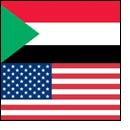Powell stands firm on Darfur as Khartoum rejects ultimatum
 KHARTOUM, July 31 (AFP) — US Secretary of State Colin Powell vowed to forge ahead with efforts to end the conflict in Sudan’s Darfur region, despite Sudan’s rejection of a UN resolution threatening sanctions unless it reins in pro-government militia in the region.
KHARTOUM, July 31 (AFP) — US Secretary of State Colin Powell vowed to forge ahead with efforts to end the conflict in Sudan’s Darfur region, despite Sudan’s rejection of a UN resolution threatening sanctions unless it reins in pro-government militia in the region.
France on Friday ordered its troops stationed in Chad to provide security along the border with the troubled Darfur region, as Khartoum vowed a general mobilisation against any foreign military intervention in its troubled region.
“They can say whatever they wish to say. The Security Council has spoken in rather strong vote,” Powell told reporters in Kuwait City as he wrapped up a swing through the Middle East.
“The issue is now to move forward and to help the suffering people of Darfur. I hope the Sudanese government will use the time provided in the resolution to do everything it can to bring the Janjaweed under control,” he said.
The UN Security Council on Friday gave Sudan 30 days to rein in the pro-government Arab militia known as the Janjaweed, blamed for atrocities in its western region, or face international action.
Thirteen of the 15 Security Council members backed the text which carries an implicit threat of sanctions against Khartoum. China and Pakistan abstained.
The Sudanese government late Friday rejected the resolution, calling for more time to implement existing promises to disarm the militia, and insisting that sanctions would only aggravate the situation in Darfur.
“The resolution is inappropriate,” said a government spokesman, accusing the Security Council of “disregarding” efforts being made to resolve the crisis by the Sudanese government, the African Union (AU) and the Arab League.
“The resolution concentrated on disarming the Janjaweed only, instead of calling for disarming all other militias simultaneously,” Abdel Basit Sabdarat, minister for parliamentary relations, told Sudan’s Al-Ayam daily.
However, he said Khartoum was “serious about solving the Darfur problem and has actually begun trying the Janjaweed and investigating the raised accusations”.
The 53-member AU meanwhile appeared set to dispatch a force of some 300 troops to Darfur next week to protect AU monitors overseeing a shaky ceasefire between Khartoum and Darfur’s two rebel groups, the Sudan Liberation Army and the Movement for Justice and Equality.
Powell voiced his strong support for the AU initiative to settle a conflict that has already claimed up to 50,000 lives.
“I hope the African Union will move forward aggressively as they have said they would, in order to help these people and help to restore a sense of security,” he said.
More than a million people have been displaced in the conflict between the rebels and Khartoum-backed Janjaweed fighters, who are accused of atrocities against the civilian population caught in the middle.
The conflict broke out in February last year when the rebels revolted against Khartoum, giving rise to what the United Nations has described as the world’s worst humanitarian crisis.
French President Jacques Chirac ordered the mobilisation of French troops already stationed in Chad across the border from Sudan’s Darfur region to assist with the situation there.
“The observation force … will participate in the securing of the area on the Chadian side of the border, with a unit (of around 200 troops) deployed on the border,” said a statement from Chirac’s office.
France also said it would also make military transport available to bring in humanitarian aid.
Some 200,000 Sudanese have fled the fighting in Darfur to Chad, where their security is also precarious.
Egyptian President Hosni Mubarak sent a message to Sudanese President Omar al-Beshir over the crisis, to be delivered by his foreign minister in Khartoum later Saturday.
Cairo, which has been urged by the United States to use its influence over Sudan to solve the conflict, has tried to temper international pressure on its southern neighbour.
Egypt said late Friday it was pleased with the final, watered-down version of the UN resolution — the United States dropped an explicit reference to sanctions, replacing it with “measures”, in a bid to win support for the text.
However Egyptian commentators on Saturday voiced concern that a foreign military intervention could have catastrophic effects for the region.
Mustafa Alwi, political analyst at Cairo university, feared that such an intervention could lead Sudan to become a “new regional hotbed of terrorism and instability”
